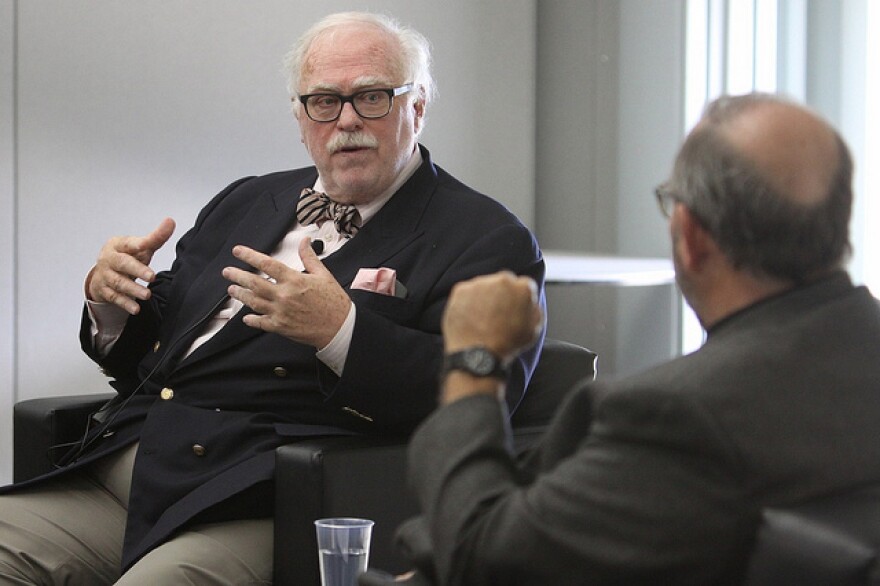Truth matters. Community matters. Your support makes both possible. LAist is one of the few places where news remains independent and free from political and corporate influence. Stand up for truth and for LAist. Make your year-end tax-deductible gift now.
This is an archival story that predates current editorial management.
This archival content was written, edited, and published prior to LAist's acquisition by its current owner, Southern California Public Radio ("SCPR"). Content, such as language choice and subject matter, in archival articles therefore may not align with SCPR's current editorial standards. To learn more about those standards and why we make this distinction, please click here.
Kevin Starr, Lion Of California History, Dies At 76

We see California history as charged with myth and hope and tragedy because of Kevin Starr. The history of the Golden State is inextricable from its greatest chronicler, the fourth-generation Californian who spent decades completing a multi-volume history that is widely considered to be the definitive account of the California story.Starr, a professor of history at the University of Southern California and former California State Librarian, died of a heart attack in San Francisco on Saturday, leaving behind an indelible mark on his native state. He was 76.
Starr published more than a dozen books during his lifetime including “Americans and the California Dream,” his multi-volume history of the state. He was appointed as state librarian by Gov. Pete Wilson in 1994 and served for a decade. Gov. Arnold Schwarzenegger named him state librarian emeritus when Starr retired from the post in 2004. Starr was awarded a National Humanities Medal by President George W. Bush in 2006. In his role as state librarian, Starr backed wide-ranging library and reading programs, A 2001 state bill, known as the Kevin Starr Access to Information Act, helped improve library systems for disabled patrons.
"Kevin Starr chronicled the history of California as no one else," Gov. Jerry Brown said in a statement Sunday.

Kevin Starr at a 2009 literary luncheon for the launch of one of the books in his "California Dream" series. (Photo by Dietmar Quistorf, USC)
Starr was a prominent public intellectual and a member of seemingly every facet of California high society, but he was also known as a teacher and a mentor to many. I went to USC because I wanted to study with him.
Imagine being 20 or 21 and having loved one subject desperately all your life, and then sitting before the Great Man who made that subject into a field. To sit in Kevin Starr's office was to never be able to write fast enough, and to wish you had at least three more hands and six more ears, just so you could be getting all of this down. He was generous with his time and knowledge. His California, shot through with titanic possibility and recurrent loss, was inclusive: it was yours, too. "We have a similar sensibility about what is important," he would say, and you'd think you'd died and gone to heaven. "We Californians," he would add, prefacing some fact or idea.
"Let me just stop and contemplate the pleasure you are going to have, reading this master spirit," he would tell you, in typically grand terms, as he added another author to your list.
Starr seemingly possessed the entirety of the Western canon at his fingertips. He appeared to play all of history and literature and poetry and art like a massive, invisible stringed instrument—plucking unlikely, inevitable connections across worlds and disciplines. His knowledge was encyclopedic and lyrical and incomprehensibly vast. But most of all, it was joyous. He loved this place with every fiber of his being.
In person, he seemed almost from another century, as if he, in his suit and bowtie and formal speech, could have slipped forward in time from any one of his books. In the classroom, his histories tumbled out like epic poetry, each event driven by individual narrative and yet still rhapsodic in its place in the scheme of it all. Everything about Starr's California was writ large: the tragedy, the humanity, the dream. "Whatever else California was, good or bad," he once wrote, "it was charged with human hope."
"What Starr did was to write about California not only as its own place, but as a symbol of the animating idea of America, and to show how California’s rise exemplified the American dream just as the problems of California displayed the difficult issues of the nation,” his longtime friend and colleague (and current California Poet Laureate) Dana Gioia told SF Gate.
"The more I investigate California, the more American it seems," Starr once said. "It's an intensification of the American experience, and it's also the American experience in common."
"In his magnificent, booming voice, bowtie, and pinstripes, Kevin taught me how to study California," his former student Chiara Towne told LAist. "While doing so, he taught me what it means to be a historian. He showed me, through his genuine, unending curiosity, that history is not a question of who won and who lost. It is not who gets to tell the tale, or how to tell it. But instead—how much can we uncover? How much can we know?"
“He was the greatest historian Los Angeles and California ever had and ever will have,” former Los Angeles Mayor Richard Riordan told the L.A. Times.
During the first course I took with Starr, he read aloud from The Literature of California. It was a fragment of an early Native American poem, and his voice broke as he read it. "I'm sorry," he said, "I'm just an old man moved to tears by the beauty of this poem."







